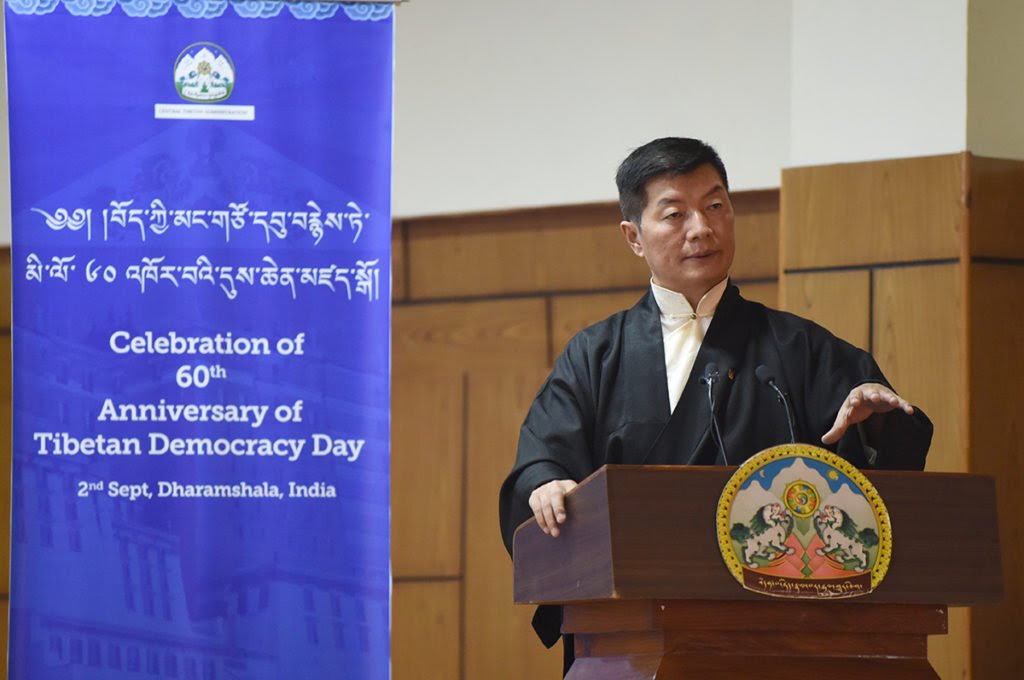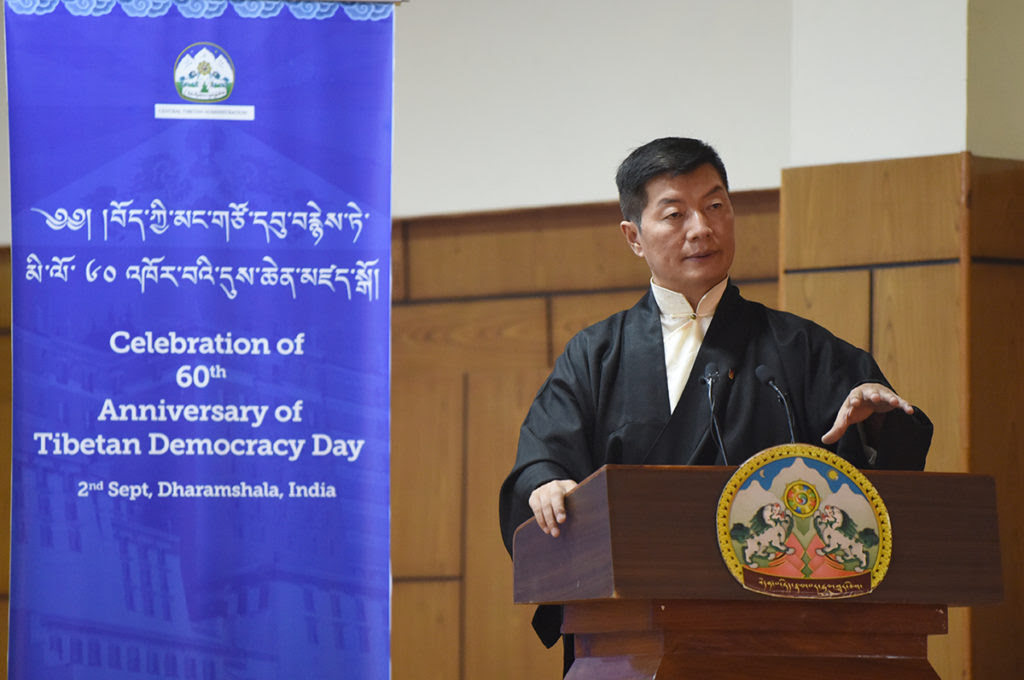 ‘Among the countless legacies of His Holiness, one of the greatest legacies is his democratic ideals,’ Sikyong in his address at the celebration of the 60th anniversary of Tibetan democracy day at CTA headquarters. Photo/Tenzin Phende/CTA
‘Among the countless legacies of His Holiness, one of the greatest legacies is his democratic ideals,’ Sikyong in his address at the celebration of the 60th anniversary of Tibetan democracy day at CTA headquarters. Photo/Tenzin Phende/CTA
Tibetans worldwide on Wednesday celebrated 60 years since it took its first crucial step towards democracy with the establishment of the first elected representative body of Tibetan people (then called The Commission of Tibetan People’s Deputies) guided by the pioneer himself, His Holiness the Dalai Lama which forever changed the course of Tibetan history.
The senior leadership of the CTA observed a ceremony at the headquarters here to mark the historic day, and to pay tribute to His Holiness for the priceless gift of democracy.
“For the last sixty years, it was His Holiness’ vision, his idea which was way ahead of many other countries and definitely ahead of Tibetan society,” said Sikyong Dr Lobsang Sangay, speaking on the occasion.
On March 2011, His Holiness the Dalai Lama had relinquished all his political authority to the democratically elected leader, Dr Lobsang Sangay in what marked as the final transition of Tibetan political system to a full-fledged and matured democracy.
Describing His Holiness extraordinary commitment and leadership to these reforms, Sikyong Dr Sangay said, not only did His Holiness reject his people’s repeated pleas for him to remain in power but ‘even from as early as 1963, His Holiness mandated that there be a provision of his own impeachment in the constitution’.
Among the countless legacies of His Holiness, he said, one of the greatest legacies is his democratic ideals.
Sikyong offered his profound gratitude to His Holiness for the gift of Tibetan democracy which over the last 60 years has progressed and matured into a full-fledged democratic system with elected representatives from the three traditional provinces of Tibet, four Buddhist sects and Bon religion—thus lending the CTA leadership uncontested legitimacy as the true representative of the Tibetan people and their aspirations.
The democratically elected Tibetan leader also refuted Chinese President Xi Jinping’s recent policy directions proposed recently at the top-level meeting on Tibet governance and called them completely “misguided, flawed” and “absolutely unacceptable.”
At the 7th Central Symposium on Tibet Works from 27 to 28 August, Xi Jinping had laid out four key policy directions on Tibet which include combating ‘separatism’ to instil devotion for the “motherland” and Sinicizing Tibetan Buddhism and adapting Tibetan Buddhism into Chinese socialist system.
“I would like to strongly refute the speech made by Chines President Xi Jinping and the visit of the foreign minister [Wang Yi] to Tibet,” Sikyong said.
In both the speeches, he added, they introduced major policies and guidelines all of which were a clear indication that “ultimately the Chinese govt want to convert Tibet into a Chinese province and make Tibetans into Chinese people.”
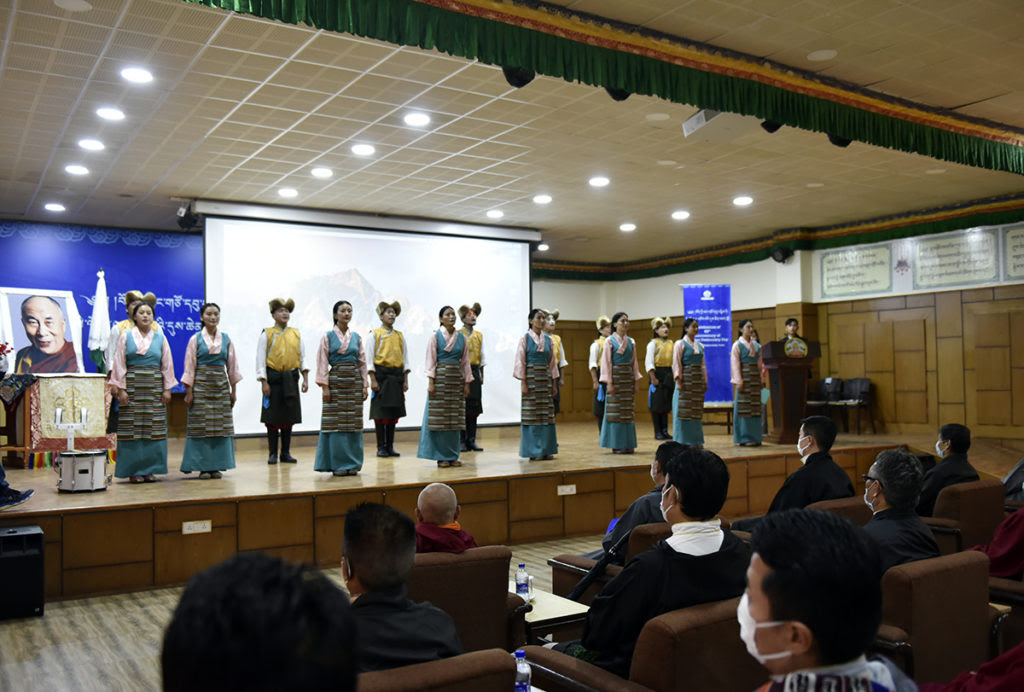 The CTA marks the 60th anniversary of Tibetan democracy day on 2 September 2020.
The CTA marks the 60th anniversary of Tibetan democracy day on 2 September 2020.
Rejecting Xi’s policy to “adapt Tibetan Buddhism to socialism in the Chinese context” as the most vicious policy on Tibet yet, he said to force Tibetans who have embraced and practised Buddhism as the centre of their lives to treat communism as more important than their faith is not only a violation of international religious freedom but is absolutely unacceptable.
“To say Buddhism should serve the CCP ideals and motherland of China is absolutely unacceptable to us.”
“Especially to Tibetan monks and nuns, they regard the monastery as their home and next life as more important than this life. To make Buddhist ideals, beliefs lower than national laws, motherland and communist party is in clear violation of religious freedom. It is absolutely unacceptable.”
Furthermore, Sikyong noted that the extent of policy and guidelines strategised at the top-level Chinese meeting were indicative of the crucial importance of Tibet to China’s stability and security.
“They have said stability and security of China is dependent on the stability and security of Tibet, that’s why they visited Tibet. It clearly indicated how important Tibet is from foreign policy point of view.”
“What this means is more repression for Tibetan people; more discrimination of Tibetan people, more violation of Tibetans basic human rights.”
In a message to China, he said ‘His Holiness is the solution to the Tibet issue, he is not the problem. The problem lies solely with the repressive politics of the Chinese govt, misguided policies of the Chinese govt.’
In conclusion, he reaffirmed the CTA’s commitment to the Middle Way Approach and pledged to carry forward the vision of His Holiness by strengthening the foundations of Tibetan democracy.
Speaker Pema Jungney in his remarks said that unlike most countries whose people had struggled and given up lives for democratic rule of law, however, for Tibetans, “there never was any need for the people to sweat it out and shed blood through carrying out struggles, raising disturbances, and so on even to a minuscule level.” Rather it was gifted by His Holiness to his people.
“Even under the enormity of the tangles of hardship in living conditions that the situation in exile entailed in the early years, His Holiness made it a point to immediately resume his efforts to carry out the visions he previously had to direct the political system of the Tibetan people to the path of democracy,” Speaker Jungney said.
The celebration also featured felicitation of meritorious students including Sikyong scholarship recipients, Gaden Phodrang Awardees, recipients of Youth Empowerment Award and CTA staff who have completed 25 years of service.
Office of Tibet Brussel’s short documentary “I admire the spirit of the European Union – His Holiness the Dalai Lama”, Office of Tibet, DC’s docu-film ‘MAN OF COMPASSION, Stories of His Holiness, the 14th Dalai Lama’ and TIPA’s Yarkyi 2020 album were also unveiled at the event.
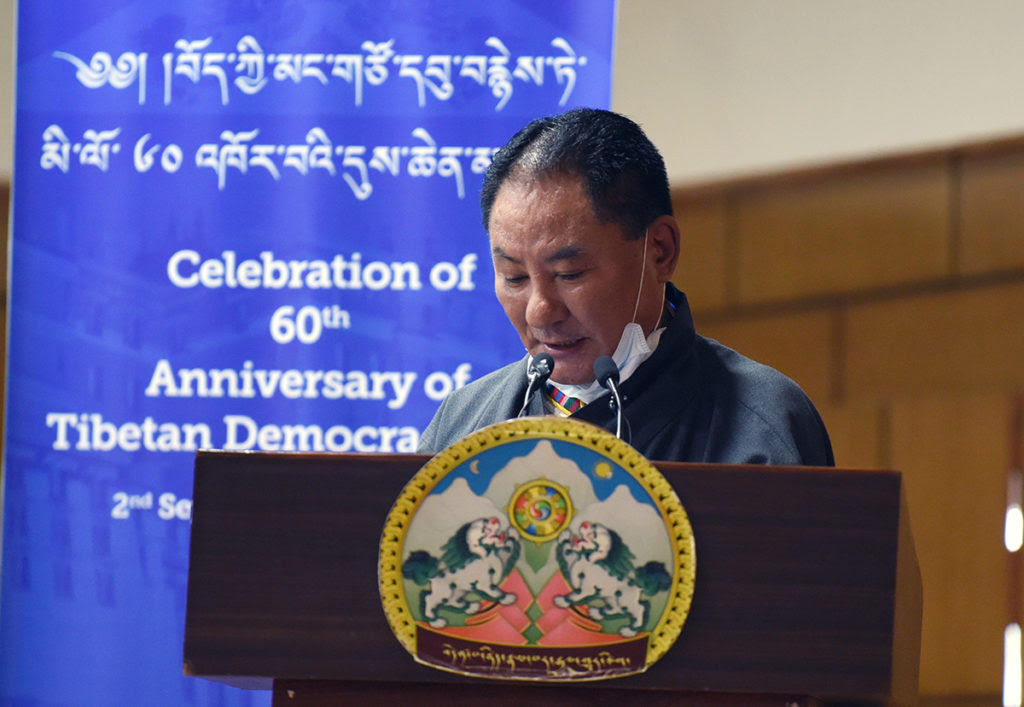 Speaker Pema Jungney, Tibetan Parliament-in-Exile delivering the TPIE’s statement on the 60th anniversary of Tibetan democracy day.
Speaker Pema Jungney, Tibetan Parliament-in-Exile delivering the TPIE’s statement on the 60th anniversary of Tibetan democracy day.
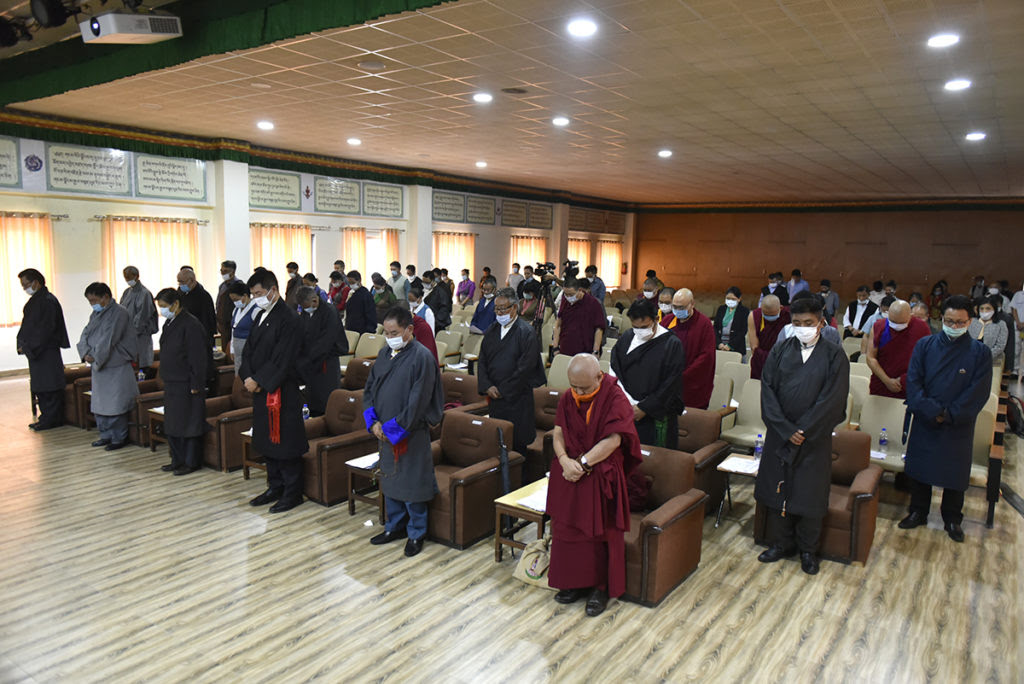 The CTA gathering observes a moment of silence to mourn the demise of the former Indian president Shri Pranab Mukherjee.
The CTA gathering observes a moment of silence to mourn the demise of the former Indian president Shri Pranab Mukherjee.
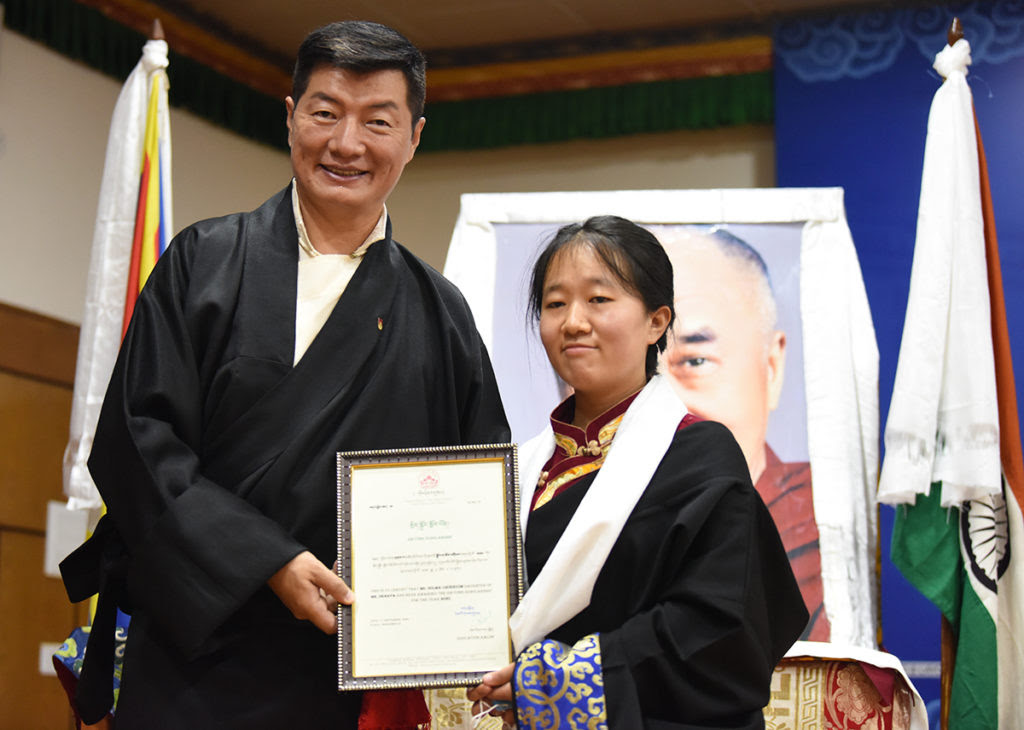 Sikyong felicitates awardees of Sikyong Scholarship for Academic Excellence.
Sikyong felicitates awardees of Sikyong Scholarship for Academic Excellence.
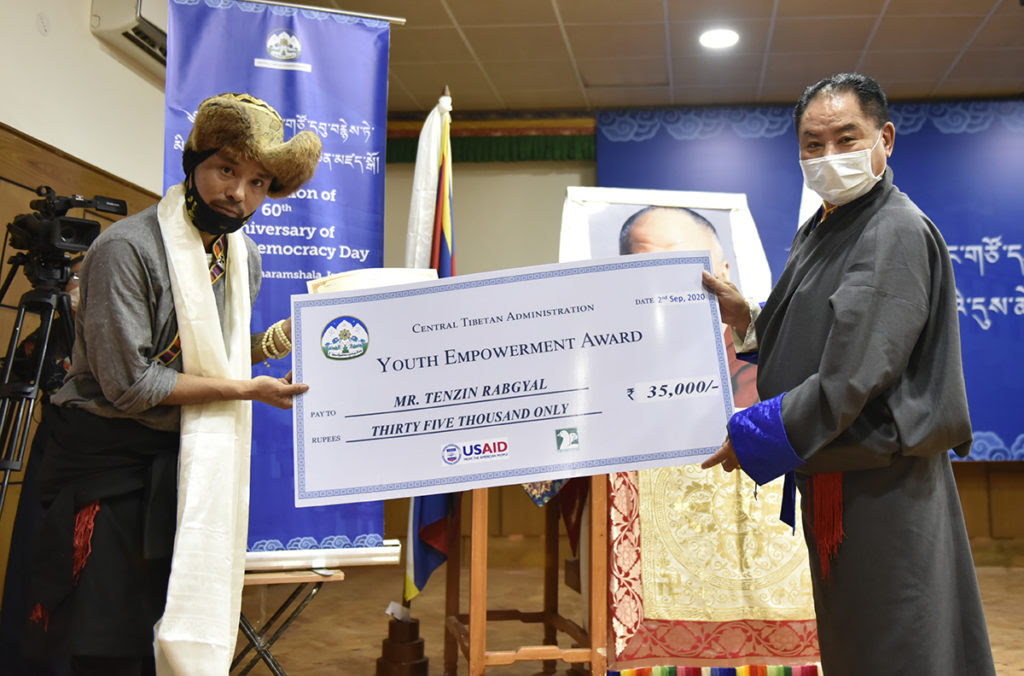 Speaker Pema Jungney presents the Youth Empowerment Award.
Speaker Pema Jungney presents the Youth Empowerment Award.
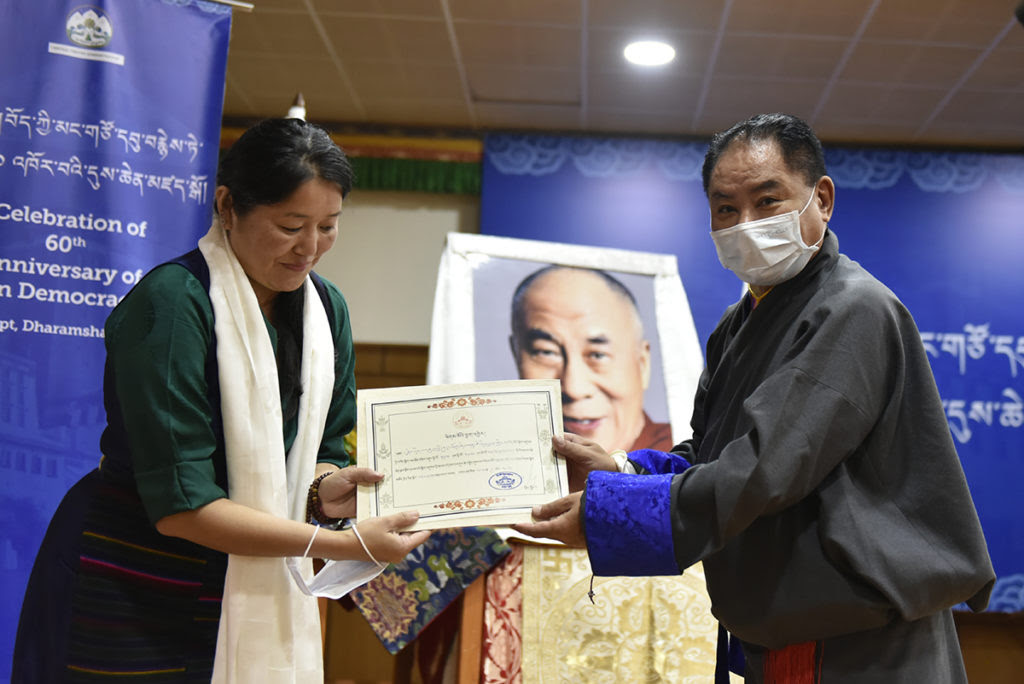 Speaking felicitates CTA staff for completing 25 years of service.
Speaking felicitates CTA staff for completing 25 years of service.
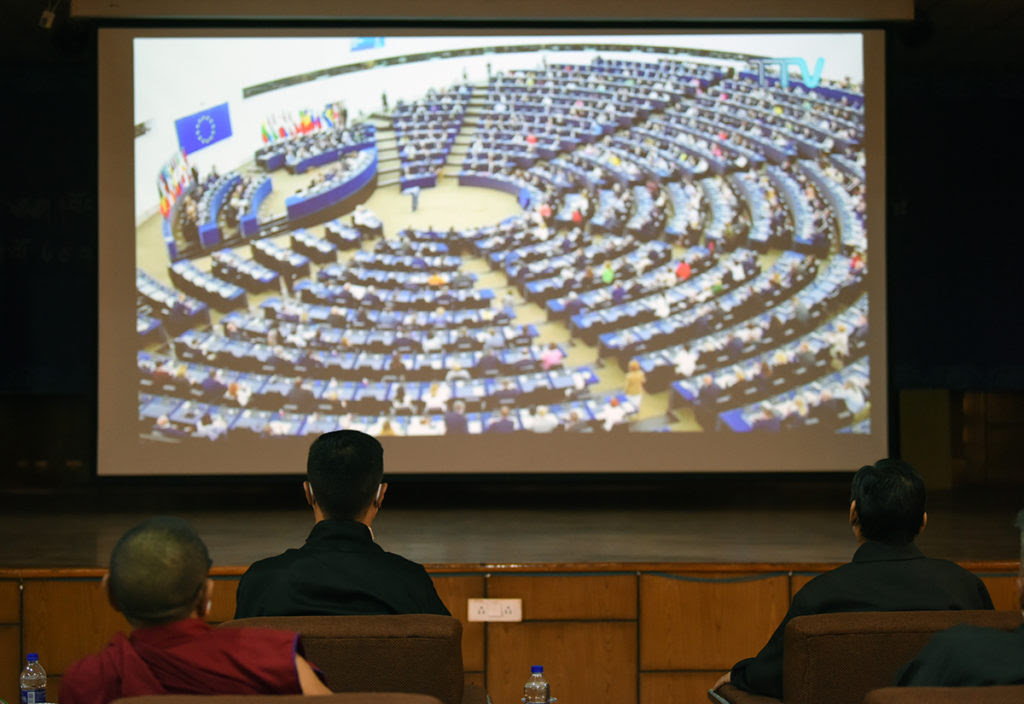 Inaugural screening of Office of Tibet Brussel’s short documentary “I admire the spirit of the European Union – His Holiness the Dalai Lama”.
Inaugural screening of Office of Tibet Brussel’s short documentary “I admire the spirit of the European Union – His Holiness the Dalai Lama”.
source – cta


